Budget 2020: Weight of the nation on Josh Frydenberg’s shoulders
The long road Scott Morrison and Josh Frydenberg have taken to today has redefined budget-making and Liberal orthodoxy.
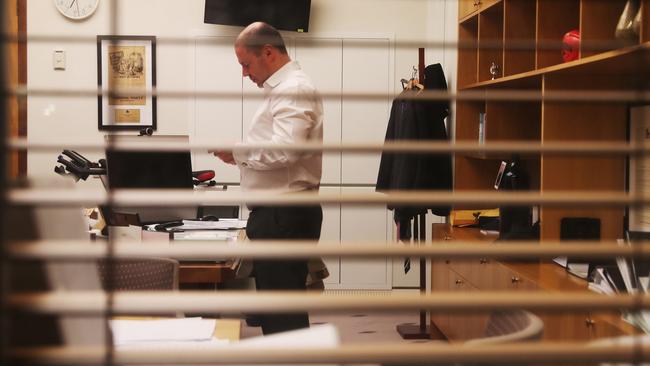
In mid-March, Josh Frydenberg’s second budget was a mere eight weeks away. The direction was set: the first surplus in 12 years to restore a fiscal buffer, reforms to raise the economy’s speed limit, capital works for bushfire and drought recovery, and tidy housekeeping on costs.
But closing borders to China on February 1 to deal with the pandemic’s first wave had started to bite. With the daily number of new coronavirus cases hitting 100, the stockmarket tanking, interest rates falling and strict lockdowns looming, it was time to break the glass on Treasury’s emergency plan.
The Morrison government pushed out a $17.6bn stimulus package to put a floor under household spending and confidence. Yet even before the first $750 splash landed in a pensioner’s account, COVID-19 shrugged, jumped ship and went on a spree. And so did the one-time fiscal conservatives, who would eventually sink another $300bn into the crisis.
Amid the turmoil of rising infections, without any firm ground for officials to make reliable forecasts of spending, taxing and growth, the May budget was deferred to October 6, an eon away, as Australians began living day to day, and certainly not hand to mouth.
That long, winding and dark road to Tuesday’s big reveal has redefined budget-making and Liberal orthodoxy. Scott Morrison and Frydenberg would progressively ditch fiscal rules, shake the bureaucracy for left-field ideas, virtually nationalise company payrolls and live by the mantra that every spending proposal served up by departments and ministers would be judged by a single metric: job creation.
“In this year’s budget there are so many more measures both by number and by size than previous budgets, a reflection of the economic challenge we face” says Frydenberg in his Parliament House suite, cramming for the event that will define his custodianship and the nation’s immediate future.
“It’s taken a lot of work over a long period of time to get to this point, and you’ve seen just in the volume of announcements pre-budget how much activity there is, how significant the announcements are and how broad-ranging they are”.
Australia and the world are being unmade in ways not seen since the Great Depression, with vast disruption to industries and supply chains, rising protectionism, accelerated technological change, and ordinary life turned upside down.
“It is what it is,” says Frydenberg of the structural makeover. “What we need to do is to ensure the economy adapts and is best placed to adapt.” Canberra will soon be carrying a $1 trillion-plus debt, a fact the Treasurer is unperturbed about.
“It’s important to understand that while the debt burden has increased through this crisis, by growing the economy and getting people back to work, you can strengthen the budget as well. It’s a virtuous cycle of jobs, growing the economy, strengthening the budget.”
‘Our values endure’
The Treasurer is gregarious, a doting father, in constant electronic dialogue with the universe, but making the budget has been a monastic life of Zoom meetings, gulps of pod coffee and frantic workouts on an exercise bike in the corner of his office, a bunker during the pandemic.
With thousands of words and numbers still roiling in his head, what can possibly bind this massive endeavour together?
“Values,” he says circling back to last year’s budget speech where he extolled freedom, thrift, hard work and self-reliance. The pandemic has sharpened his priorities, and pushed him to the middle ground, his natural home.
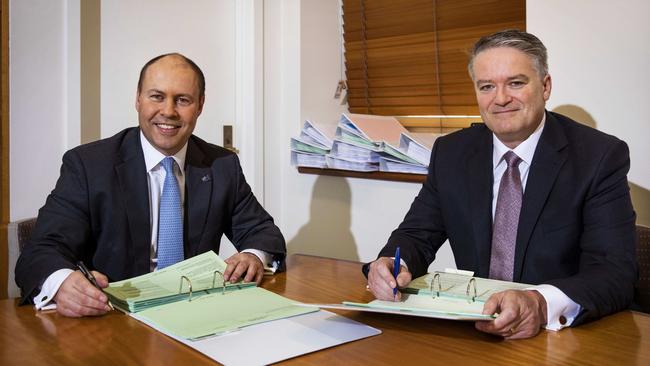
“Our values endure. Helping those who need it, it’s a really key value,” he says explaining the budget’s major theme. In the speech, the Treasurer will try to connect with those most affected – small-business owners who have lost it all, seniors in home isolation, young people out of work and losing hope, families relying on income support for the first time — to give them assurance no one will be left behind because of the health and economic shocks.
“Some jobs won’t be there on the other side of COVID,” he says. “The lesson from previous recessions is that it takes many, many years to get those jobs back. So our focus, and the budget’s focus, is on giving us as a nation the best possible chance of getting those jobs back as quickly as possible.”
Pragmatism rules
A week after national cabinet was born in mid-March, the Prime Minister launched a $66bn “economic security blanket” of business support and a doubling of welfare payments to “cushion the blow” of tough stay-at-home measures that would take effect immediately.
The next morning, the Treasurer was shocked by the vast queues outside Centrelink offices. “They were heartbreaking, for the country,” Frydenberg says of the day COVID-19 mutated into a full-blown calamity. Over the next two months Services Australia would process 1 million claims for the rebadged dole, now known as JobSeeker.
In those shakiest of times, Frydenberg turned to John Howard, the former prime minister he had worked for in his 30s. The economy was on the precipice and the Liberals’ grand helmsman told him in “times of crisis there are no ideological constraints”.
Howard’s advice may have been liberating, perhaps a little daunting, for more doctrinaire operators. But not Morrison and Frydenberg. “Scott and Josh are both professional politicians, first and foremost,” says a Liberal insider who knows both of them well. “Their instincts are to do whatever is needed to get the job done quickly.”
Pragmatism would rule, as the key people in government worked on a battle-ready rhythm, with minimal sleep and maximum control over every aspect of fighting the virus, and preserving as much of the economy’s heartbeat as possible
Over the next few months the tight group of ministers who form cabinet’s expenditure review committee — chaired by Morrison, and including Frydenberg, Deputy Prime Minister Michael McCormack, Finance Minister Mathias Cormann and Health Minister Greg Hunt — would rewrite the fiscal record books.
On March 30, the Prime Minister announced a $130bn wage subsidy, JobKeeper, to keep employers and an expected 6 million employees connected through the deepening crisis. In April, the payment was going to 720,000 workers whose hours were reduced to zero.
Frydenberg was saying privately the pandemic budget was the most difficult to land in living memory. Forecasting was fraught, dependent on state government restrictions on movement and trading and a murky global outlook, amid deteriorating relations with China. Treasury’s initial estimates of a 20 per cent drop in gross domestic product in the June quarter were “the economists’ version of Armageddon”, in Frydenberg’s words.
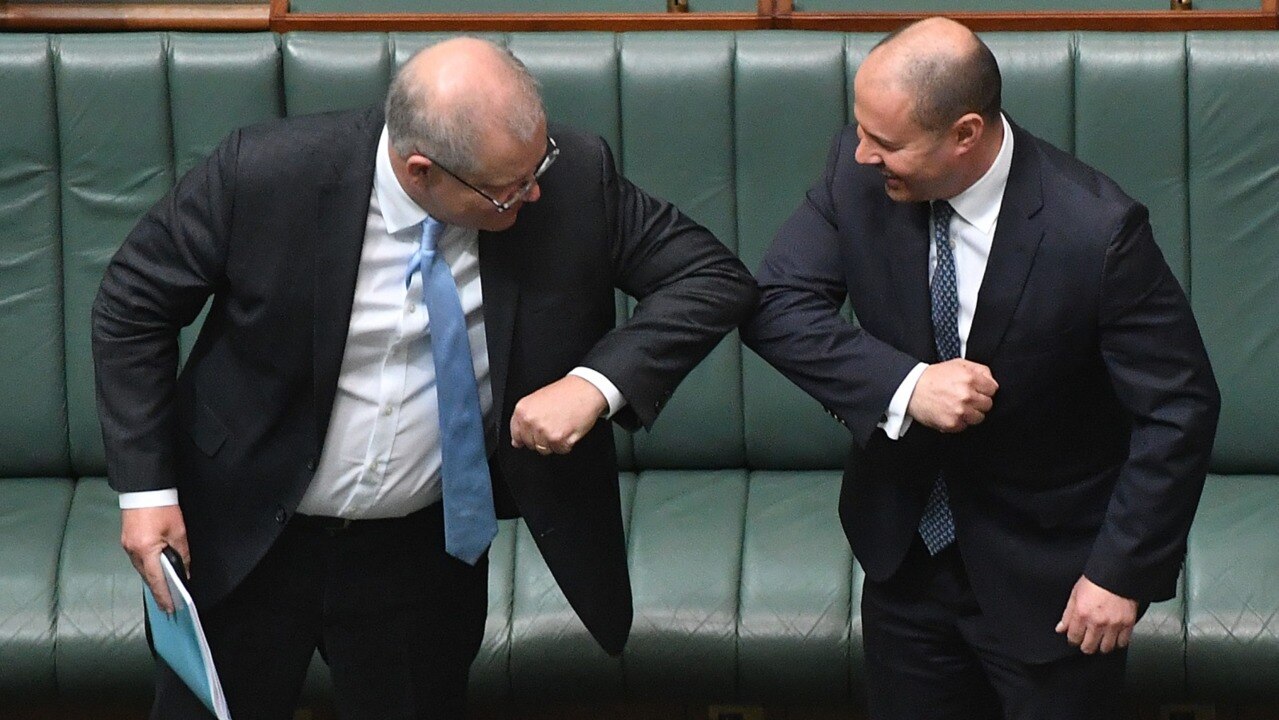
April was the cruellest month as restrictions on trade produced a 19 per cent fall in retail sales. Many jobs were gone for good. But Frydenberg’s spirits were lifted on Anzac Day, when a 99-year-old constituent in his Melbourne seat of Kooyong urged him to chase the dream. “When this corona pandemic is under control, I believe we will be like a phoenix, rising from the ashes, and with our innate resilience become stronger, hopefully more caring, hopefully more integrated, hopefully more cooperative,” Enid Williamson wrote.
Then on the day in May he should have been delivering the budget, Frydenberg suffered a coughing fit in parliament while providing an economic update.
When the March quarter GDP numbers came out in early June, a tiny 0.3 per cent contraction, the Treasurer confirmed the run of 29 years without a technical recession was over. Calling it quickly was vital to winning trust over winter when the news would be truly grim. “The importance of providing people hope and being realistic yet optimistic in a struggle such as this, is I think a key feature of leadership,” he says. “People want you to tell them as it is. If you don’t do that it doesn’t matter what you say next.”
The COVID mess
The July economic and fiscal update was tricky to manage, as Victoria’s second wave hit due to failures in hotel quarantine. Treasury was only willing to issue forecasts for two years, rather than four. The books were a mess, the balanced budget plunging to an $86bn cash deficit with $185bn the starting point for the October fiscal statement.
But a herogram to “Treasurer Josh” from Judy Bailey of Granville in western Sydney soothed his soul. “The majority of the Australian people don’t blame you for yesterday’s budget. It was not your fault. It was the fault of COVID-19,” she wrote, with a PS. “Paul Keating used to be my favourite Treasurer but now it is you!”
Frydenberg became increasingly concerned about the harsh curbs on liberty in his home state and the effect of lockdowns on young people, especially those trying to learn, like his two children, one at school and the other at preschool. He says kids will never get that year back. “To think you can transplant the experience of the classroom into the living room is rubbish,” his voice wavering and rising sharply on the last word.
The government announced JobKeeper would be extended to the end of March, while the coronavirus supplement would finish at the end of December, but both payments were to be cut by $300 a fortnight. The thinking inside the budget bunker was work incentives had to be preserved, while avoiding building costly new sources of welfare dependency.
‘Keep on keeping on’
In early spring, the data showed a 7 per cent fall in June quarter GDP, confirming the recession. Knowing it was coming didn’t make it any easier for the community. It may have been a lot better than the case for New Zealand, Britain, the US and France, but the second wave in Victoria would hold back the national recovery and blow out the income support bill.
For the ERC, more spending on health and aged care became no-brainers, especially in light of failures in protecting seniors in nursing homes. Yet the usual fiscal constraints would not plague the group in this crisis. Ministers feared the risk was not spending enough rather than too much. The bias was on relief for the “here and now”, given the Reserve Bank had run out of firepower after two 25-basis-point cuts to official interest rates in March.
Still, Treasury officials were worried about waste. Every extra dollar spent was borrowed, so quality could not be sacrificed for expediency because it would cause problems down the track. They also wanted to restore the buffer for the next crisis.
By early September, with the ERC’s work almost done and dusted and the finish line in sight, Frydenberg sounded tired; a colleague said “he looked shattered”. People the Treasurer spoke to regularly would get phone calls late at night or very early in the morning, the weariness in his voice in contrast to his usual vim. “It was gruelling,” he says of that time. “But I needed to be [in Canberra], with my staff, the Treasury team, with the Prime Minister working through the details of the budget.”

Over the 90 days leading up to the budget, Frydenberg managed only 20 at home, including Father’s Day and his daughter’s sixth birthday, a disco party over Zoom. There were also 50th birthdays celebrated remotely for close friends; the Treasurer reaches that milestone next July.
ERC wanted immediate results, spending that would create jobs directly and quickly. Legislated personal income tax cuts were brought forward and a tax break for investment, already pencilled in for May, was boosted. Business lobbyists were concerned, however, that details of a research-and-development incentive were taking longer to finesse.
With spending set, the Treasurer began casting about for help on his speech, rather than crafting it himself as he usually does. With an adviser he worked through drafts, testing lines with staff, colleagues and party people Frydenberg trusted. Yet in the end, he decided to carry the writing load. “This budget is so important, I had to own all of it,” he says of the speech and budget papers that were sent to the printer over the weekend. “I want an Australia that is open, that is fair, that is strong and that provides opportunity.”
On Monday morning Frydenberg had reset to his old normal: perky and game. He FaceTimed his family, as he does several times a day. It was his mother Erika’s birthday. She was reading a story to granddaughter Gemma, who was starting term 4 but couldn’t go back to the classroom. Wife Amie was getting three-year-old Blake ready for kindy. “Dad, we’re too busy to talk!” the kids said. At least he hadn’t called during Bluey.
“That’s the beating heart of the nation right there,” an excited Treasurer tells The Australian, before heading back to the bunker to rehearse his speech. “The kitchen table on a busy Monday morning, people just getting on with their lives. We all keep on keeping on.”


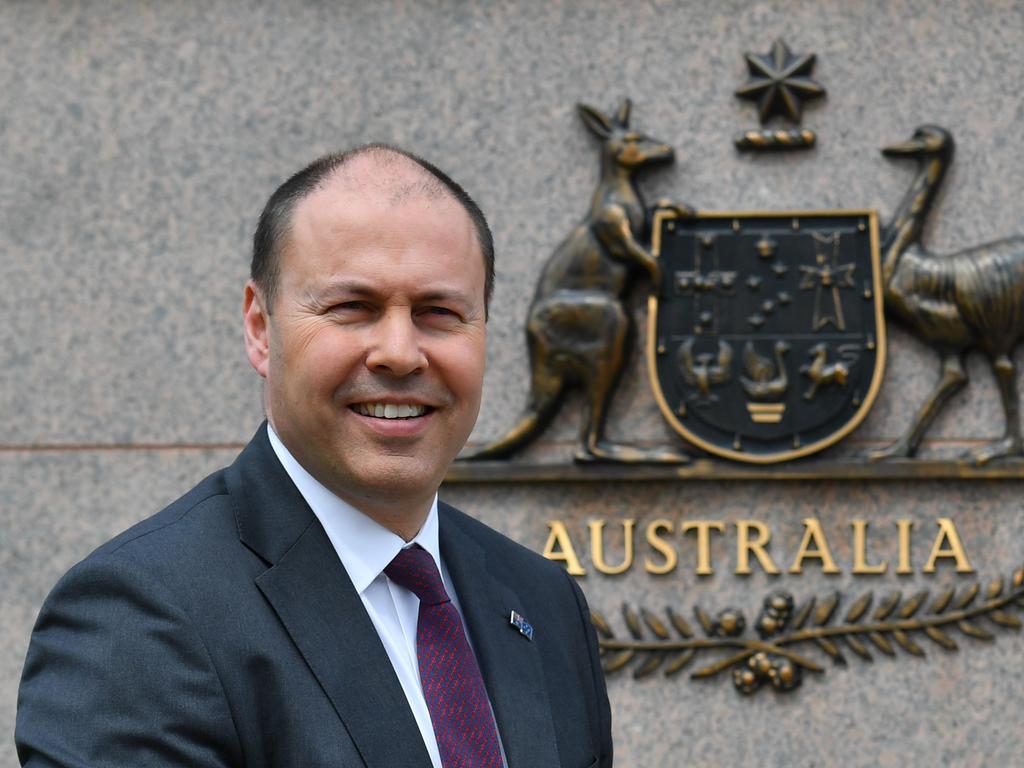
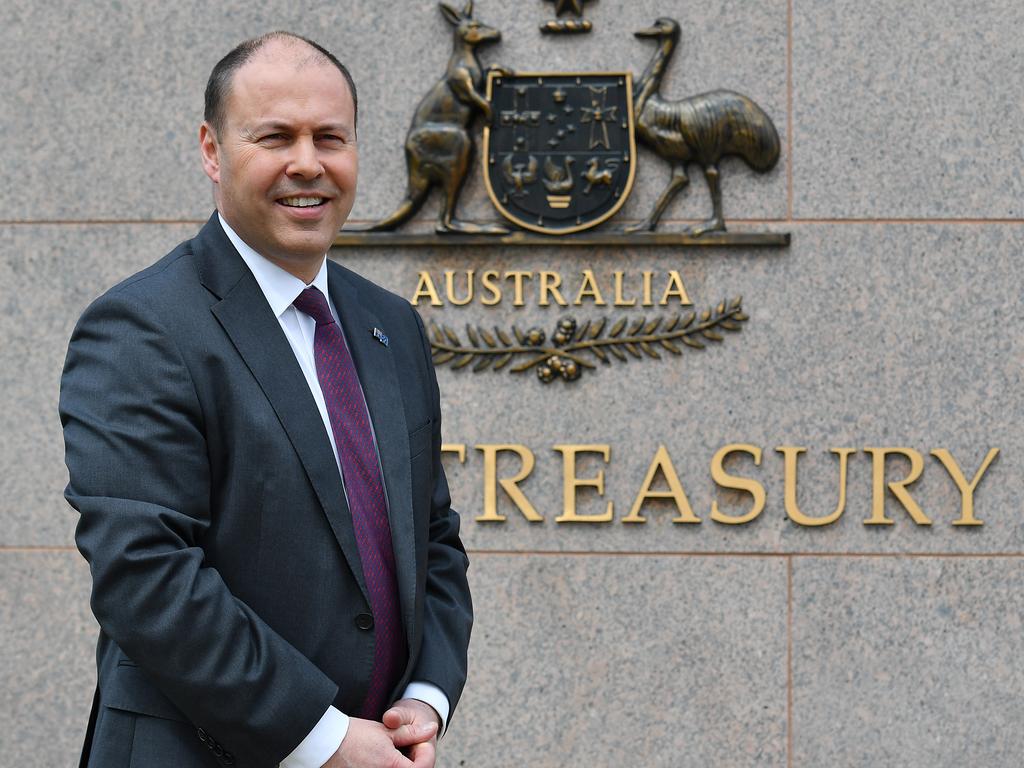
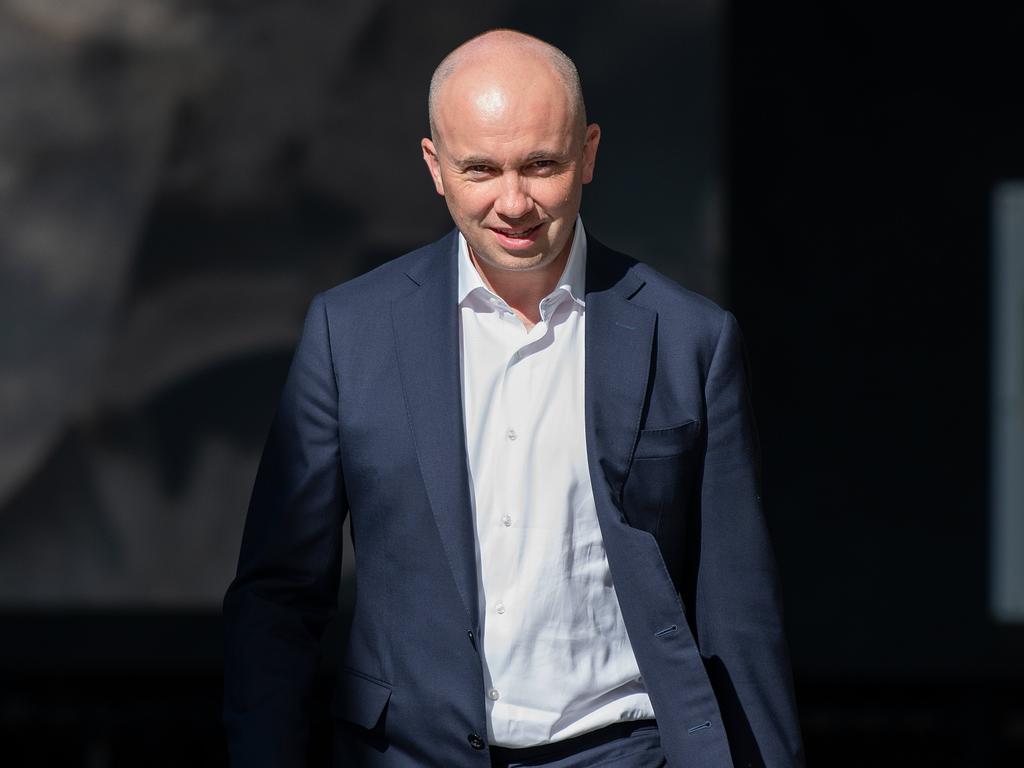
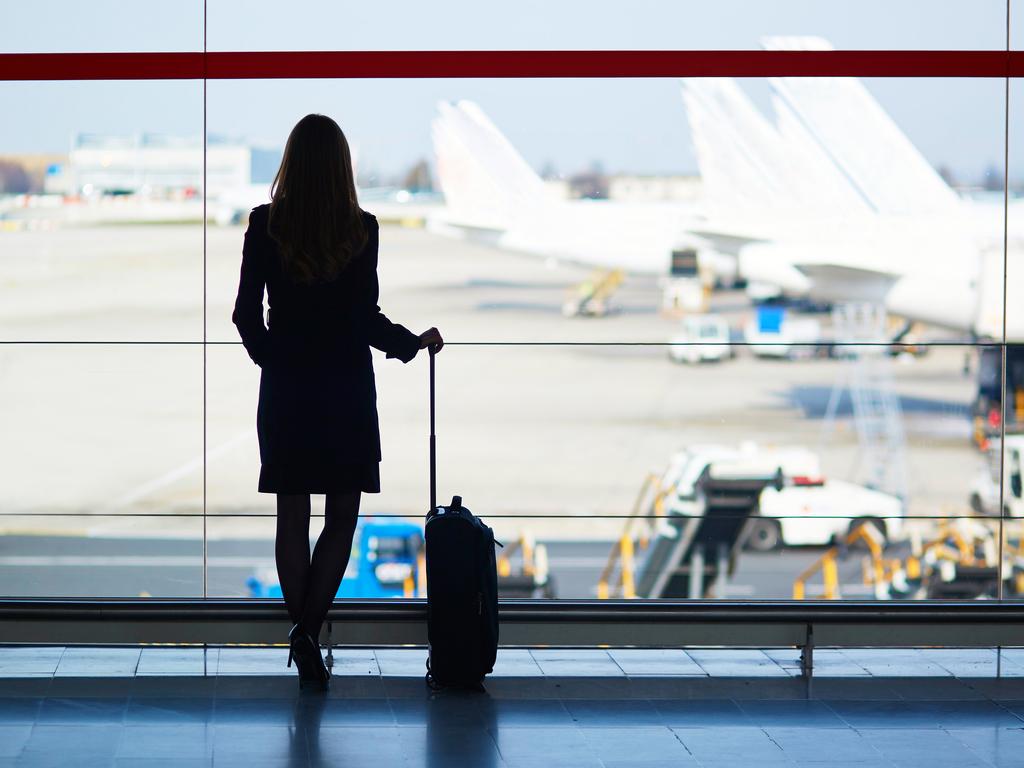
To join the conversation, please log in. Don't have an account? Register
Join the conversation, you are commenting as Logout